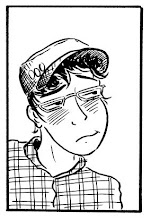Suicide and Sexuality, Media and Mayhem
The past three weeks have been incredibly upsetting. Six young men have taken their lives due to the anti-gay bullying they were the focus of at their schools. None of these young men were connected--they did not go to the same schools, have the same socio-economic backgrounds, come from the same hometown.
However, there is a unifying factor among these young men--somehow, their peers had decided that they did not fit the right gender mold, and therefore deemed them worthy of scrutiny and brutality. Never mind whether they were *actually* gay or not.
I've been doing a lot of thinking about this. The absolute root of my politics is that sexism, classism, and racism are the pillars of oppression that, once toppled, could lead to a freer, kinder, gentler society. For me, homophobia and misogyny are subsets of sexism, and they are all a singular force that helps to police and patrol what's "normal" and who is "right" in our world.
When you're 12, 13, 14... Even 18, 19, 25 years of age, everything is still really confusing. Learning who you are, and who you love, and how you really want to dress--these are all confusing internal struggles that we all face, regardless of gender or sexuality. When our peers wish to taunt and poke fun and damage us during this process, the results can be ... incredibly harmful.
Sexism hurts everyone. Truly. Sexism tells men how they're "supposed" to behave. The notions of "true" masculinity are incredibly damaging, and they inherently limit a young man's full potential to really be himself. It feels so upsetting to me that we must still try to make it clear that it's alright for cisgendered men to be gentle, soft spoken, disinterested in certain activities. I thought we had gone beyond this hyper-masculinity, this ridiculous need to make sure that "MEN ARE MANLY!" But it appears I am gravely mistaken.
This situation, in the end, is only partially about making sure that schools have better policies on bullying, on peer support, and on staff and teacher support. That is only a part of the puzzle. Organizations like the Trevor Project, and initiatives like It Gets Better are also pieces of this puzzle.
We need greater Personal Visibility. It's one thing for there to be characters on television, in books, in comics, in movies. There needs to be openly gay teachers at all school levels; queer pastors and rabbis; lesbian business owners; transwomen authors; transmen comedians--ALL coming out of the woodwork, and not just to post videos online, but to turn to the youngest person in their lives and be open and honest with that youth about their own personal stories.
It might seem crazy--I might seem insane--but I've always had this idea, this concept, that if we verbalized our stories, if we all spoke our truths, we'd all feel ... safer, I think. More united. We'd have communities we didn't know we had.
When I was diagnosed with HPV, I went through a whole range of emotions. I felt a lot of things, good, bad, and ugly. I wrote two comics about the experience, one educational and personal, and one simply educational. I spoke openly about my HPV status, and additionally, spoke openly about my past safe sex experiences and my current safe sex practices.
This fascinating thing happened--suddenly, I had people telling me *their* biggest STI/STD fears. Folks of all sexualities and ages suddenly felt like they had a platform, had a friend, had a support that they could call up and ask questions or tell their stories to.
I had thought about this "story-telling saves lives" concept before then--but the experience of actually witnessing and being a part of it sealed the deal on this part of my artistic and political self. Visibility isn't just about seeing a representation of oneself in the mainstream media. It's about creating and experiencing firsthand a safe space to truly be yourself.
There is no way to bring these young men back. Even as I write this, there are tears in my eyes, because I feel a great hole in the heart of my community. When someone is murdered, there is a general and clear face and "enemy" to have strong feelings against. We are able to verbalize our upset much clearer--we are able to call it hate and call for tolerance. However, when someone takes their own life, we are forced to contend with a much much bigger problem. We must acknowledge that we must stand up and be strong against a Societal Standard. We must unite against a Cultural Norm. We must undo a History of Gender Policing, Gay Bashing, and Women Hating.
It is a radical movement to decide to take on Cultural Norms. It means we must not only examine how these norms affect the people around us and our children, but how we perpetuate these norms as well. We must be equal parts retrospective to introspective. It means we must, essentially, not only tell our stories--but listen to the stories of those we may not entirely agree with or feel comfortable hearing.

1 comment:
Yes, that's it, Katie--tell our stories from coming out to standing behind a mic (or in your case, a megaphone), and if we're so inclined via art of all sorts..."equal parts retrospective to introspective" ... listening. Thank you. Your words have moved me. Deb G.
Post a Comment